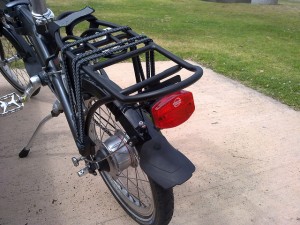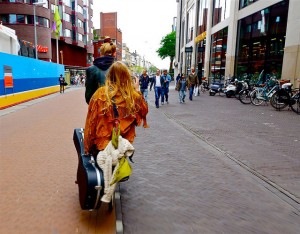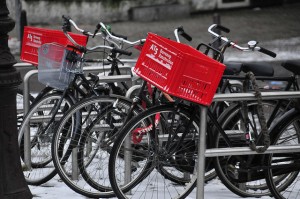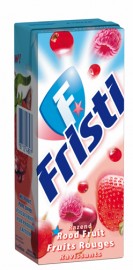luggage carrier, (rear) rack
[noun]
[de ba-ga-ge-dra-ger, de ba-ga-ge-dra-gers] ![]()
 It’s part of Dutch culture to transport a friend or your partner on the rear rack of your bicycle: the ‘bagagedrager’. Although ‘bagagedrager’ in theory can mean ‘any luggage carrier’, in the Netherlands it’s almost exclusively used for bicycles. As the name implies, originally meant for luggage or whatever goods you are transporting, however in practice it is mostly used to transport another human being. In Dutch this is called: ‘iemand achterop nemen’, where ‘achterop’ means something like ‘on/at the back/rear’. When sharing a bicycle, common questions are: ‘Ga jij achterop, of ik?’, ‘Zal ik bij jou achterop gaan?’ and ‘Mag ik achterop?’. When invited you may hear ‘Kom maar achterop’ or ‘Spring maar achterop!’.
It’s part of Dutch culture to transport a friend or your partner on the rear rack of your bicycle: the ‘bagagedrager’. Although ‘bagagedrager’ in theory can mean ‘any luggage carrier’, in the Netherlands it’s almost exclusively used for bicycles. As the name implies, originally meant for luggage or whatever goods you are transporting, however in practice it is mostly used to transport another human being. In Dutch this is called: ‘iemand achterop nemen’, where ‘achterop’ means something like ‘on/at the back/rear’. When sharing a bicycle, common questions are: ‘Ga jij achterop, of ik?’, ‘Zal ik bij jou achterop gaan?’ and ‘Mag ik achterop?’. When invited you may hear ‘Kom maar achterop’ or ‘Spring maar achterop!’.
(Photo by David Pena (flickr.com) – some rights reserved.)
 Hopping on the rear rack of a bicycle is somewhat of an art that one must master through practice. You can either sit with one leg on each side of the bicycle (only men do this), or with both legs on one side. The latter is more comfortable, but requires more ‘jumping skills’: you have to hop on while the other is cycling, otherwise it’s too difficult to ‘take off’. However, you should always jump in the direction in which the bicycle is heading, and not perpendicular to it. The latter will distort the balance of the one steering, and will also slow you down. It often helps to push with both hands holding the hips of the one steering. Many Dutch people (such as my girlfriend) still do not master this art 😉
Hopping on the rear rack of a bicycle is somewhat of an art that one must master through practice. You can either sit with one leg on each side of the bicycle (only men do this), or with both legs on one side. The latter is more comfortable, but requires more ‘jumping skills’: you have to hop on while the other is cycling, otherwise it’s too difficult to ‘take off’. However, you should always jump in the direction in which the bicycle is heading, and not perpendicular to it. The latter will distort the balance of the one steering, and will also slow you down. It often helps to push with both hands holding the hips of the one steering. Many Dutch people (such as my girlfriend) still do not master this art 😉
(Photo by Roel Wijnants (flickr.com) – some rights reserved.)
 In recent years it has become popular to mount a ‘front rack’ on Dutch bicycles, often equipped with a crate. Although popular, some people find it a nuisance as such bicycles take up more space in the already overcrowded public bicycle stalls 🙂
In recent years it has become popular to mount a ‘front rack’ on Dutch bicycles, often equipped with a crate. Although popular, some people find it a nuisance as such bicycles take up more space in the already overcrowded public bicycle stalls 🙂
(Photo by Amsterdamized (flickr.com) – some rights reserved.)
A popular song at the moment in the Netherlands is ‘Bagagedrager‘ by Dutch rapper Gers Pardoel (ft. Sef). You have been introduced to Gers Pardoel in DWOTD Animatie. This is the second hit of his debut album ‘Deze wereld is van jou’ (‘This world is yours’). I have chosen this song because of its seeming paradox: tough rappers use rough language to rap about giving girls a ride on their bicycle. The song lyrics are also informative due to the occurrence of typical Dutch phenomena, such as obviously the ‘bagagedrager’, but also Dutch bicycle brand ‘Gazelle‘, buying a bicycle for 10 euros (or guilders for those old enough) from a junkie, and the Dutch yogurt drink ‘Fristi‘.
It took me some time to figure out the lyrics, so don’t feel demotivated if you can’t immediately understand what’s being said 🙂
Lyrics
[Sef:] Spring maar achterop bij mij, achterop m’n fiets
(Come hop on behind me, behind me on my bicycle [note that ‘maar’ is used here to create a ‘friendlier’ imperative, usually translated with ‘(please) do…’ or ‘come (on and) …’. Literally this sentence translates as ‘hop on the back with me, on the back of my bicycle’. The use of “m’n” is colloquial for ‘mijn’.] )
En ik weet nog niet waar we naartoe gaan samen, maar dat boeit me ook helemaal niets
(And I do not know yet where we will go together, but I couldn’t care less [note the use of the verb ‘boeien’: to captivate, fascinate. When something ‘boeit je/jou’ it means that you are very interested by or in that something.)
En spring maar achterop bij mij, dan gaan we samen weg
(And do hop on behind me, and we will leave/depart together)
En ik weet nog niet waar naartoe maar dat maakt niet uit want ik weet wel de weg
(And I don’t know yet which way (lit. ‘to where’) but that doesn’t matter because I know the way)
[Gers:] Uh, ik ken je nog nie maar je lijkt op Barbie en het zou kunnen liggen aan die vijf Bacardi
(Uh, I don’t know you yet but you look like Barbie and that could be caused by those five Bacardis [note that ‘nie’ is colloquial for ‘niet’. The verb ‘liggen aan’ means: to be caused by, to find its cause in, to have to do with. The Dutch version of “it’s not you, it’s me” is ‘het ligt niet aan jou, het ligt aan mij’.] )
Maar ik denk dat het ligt aan je mooie face, aan die mooie en o zo grote reet
(But I think it is because of your beautiful face, because of that beautiful and very big ass [I think ‘face’ is only used here to establish assonance with ‘reet’] )
En ik hoop dat je past op m’n bagagedrager, want ik heb een nieuwe fiets ik ben een ragemaker
(And I hope you (will) fit on my rack, because I have a new bicycle and I’m a hype creator [I think ‘ragemaker’ is an invented word. Nothing to with rage; the Dutch word for hype is ‘rage’] )
En ik zet die trend, ik skip die trend, dus spring maar op bij mij die fiets dan kunnen we naar huis toe samen
(And I set that trend, I skip that trend, so hop on behind me on my bicycle, then we can go home together [note that ‘spring maar op bij mij die fiets’ is grammatically incorrect] )
En onderweg vertelde ik wat je van mij wil horen, je zat aan de bar en je wilde scoren
(And on the way I told you what you want to hear from me, you were sitting at the bar and was looking to score [actually I hear Gers sing ‘je zag aan de bar’ (‘you saw at the bar’) but that doesn’t make any sense] )
Ik ben gevallen voor je ogen en je sexy stijl, je lijkt de vrouwelijke Gersie wel
(I fell for your eyes and your sexy style, (my) you look like the female ‘Gersie’ [note that the diminutive of ‘Gers’ is ‘Gersje’, and ‘Gersie’ is the informal diminutive] )
En de volgende morgen (het) was niet te geloven, die chick die was weg en had me voorgelogen
(And the next morning; unbelievable, that chick was gone and had lied to me [‘voorliegen’ differs from ‘liegen’ in that the first implies that the person lied about what was to come] )
En ik had d’r nog wel zo lekker genomen, maar eindstand: had ze m’n fiets gestolen!
( (And all that) while I had her so good, but final score: turns out she stole my bicycle! [note that “d’r” is colloquial for ‘haar’. When a man says (the derogatory) ‘ik heb haar genomen’, it means that he ‘had her’ (or ‘had his way with her’).] )
[Sef:] Spring maar achterop bij mij, achterop m’n fiets
En ik weet nog niet waar we naartoe gaan samen, maar dat boeit me ook helemaal niets
En spring maar achterop bij mij, dan gaan we samen weg
En ik weet nog niet waar naartoe maar dat maakt niet uit want ik weet wel de weg
[Gers:] Uh, ik ken je nog nie maar je lijkt op Nikki en het zou kunnen liggen aan die vijftien whisky
(Uh, I don’t know you yet but you look like Nikki and that could be caused by those fifteen whiskies)
 Je kleding is roze met blauw; als Fristi, en je heupen zijn sexy in die strakke skinny
Je kleding is roze met blauw; als Fristi, en je heupen zijn sexy in die strakke skinny
(Your clothing is pink with blue; like Fristi, and your hips are sexy in that (/those) tight skinny (jeans) )
Misschien is het een idee om hier weg te gaan, naar een plek ergens hier ver vandaan
(Perhaps it’s an idea to depart from here (/leave this place), to a place somewhere far from here)
Naar Parijs of naar Rome, of naar Milaan, of als E.T. op een fiets helemaal naar de maan
(To Paris or Rome, or to Milan, or like E.T. on a bicycle all the way to the moon)
Onderweg vertel ik jou wat je niet wil horen, want dat is wie ik door de jaren heen ben geworden
(On the way I tell you what you don’t want to hear, because that’s who I’ve become over the years)
Nu ben ik oprecht en heb het beste voor je, het beste met je voor is soms slecht te verwoorden
(Now I’m sincere and have the best for you, ‘(wanting) the best for you’ is sometimes hard to put into words [note the expression ‘het beste met iemand voor hebben’: to want the best for somebody] )
Als ik maar met je kan zijn, de rest kan me niet schelen
(As long as I can be with you, I don’t care about the rest)
Zij waren nep en ze wilden me breken
(They were fake (/lame/stupid) and they wanted to break me)
En jij past precies op m’n bagagedrager en dat is dus wel gebleken
(And you fit exactly on my rear rack and that certainly turned out to be the case)
[Sef:] Spring maar achterop bij mij, achterop m’n fiets
En ik weet nog niet waar we naartoe gaan samen, maar dat boeit me ook helemaal niets
En spring maar achterop bij mij, dan gaan we samen weg
En ik weet nog niet waar naartoe maar dat maakt niet uit want ik weet wel de weg
[Sef:] Vanavond een donnie uitgegeven, de best bestede donnie van m’n leven
(Tonight I spent a ‘donnie’, the best spent ‘donnie’ of my life [‘donnie’ is slang for 10 euros (used to be 10 guilders)] )
Want als ik die junk geen money had gegeven, dan kon je nu niet achterop (dan kon je nu niet achterop); ah
(Because if I hadn’t given that junk money, then you wouldn’t have been able to hop on behind me (then you wouldn’t have been able to hop on behind me); ah)
Ik zag je staan met je hoge hakken, rooie lakken, zo sexy, zo’n klasse
(I saw you (standing) there with your high heels, red lacquer, so sexy, such class [normally we wouldn’t use the plural form of ‘lak’; ‘rooie’ is colloquial for ‘rode’] )
Enne, werd verblind door je oorbellen, sorry: vergeet mezelf helemaal voor te stellen
(And…, got blinded by your earrings, (I’m) sorry: completely forget to introduce myself)
Mijn naam is Sef, mag ik nu iets in je oor vertellen: ik vind je sexy, geheimpje, niet doorvertellen
(My name is Sef, now may I tell you something in your ear: I think you’re sexy, (ssht) secret, don’t tell anyone [literally: don’t tell further] )
Nee ik pest je, meisje, begrijp je wel hè, ik heb een plekje vrij op mijn Gazelle
(Nah I’m teasing you (/messing with you), girl, you understand don’t you, I have a free spot for you on my Gazelle [‘Gazelle’ is a well-known Dutch bicycle brand] )
We kunnen fietsen, flesje wijn bestellen, of dansen, ikweenie, lijkt mij gezellig
(We could go cycling, order a bottle of wine, or go dancing, dunno, seems like fun to me [‘ikweenie’ is colloquial for ‘ik weet niet’] )
Maar beter zeg ik niks, dus spring maar achterop, dan krijg je van mij een lift
(But it’s better to say nothing, so hop on behind me, and I’ll give you a ride [note that ‘maar beter zeg ik niks’ should really be: ‘Maar het is beter als ik niks zeg’] )
[Sef:] Spring maar achterop bij mij, achterop m’n fiets
En ik weet nog niet waar we naartoe gaan samen, maar dat boeit me ook helemaal niets
En spring maar achterop bij mij, dan gaan we samen weg
En ik weet nog niet waar naartoe maar dat maakt niet uit want ik weet wel de weg

 The verb ‘etteren’ has two main usages: in the medical sense it is the festering of a wound, but in daily life it is most likely showing annoying and pestering behaviour. Based on the latter translation a number of terms of abuse are in popular use: ‘etter’ (or ‘ettertje’), ‘etterbak’ and ‘etterbuil’, whereas the last one is the only one referring to the medical meaning (with ‘buil’ being a lump or swelling).
The verb ‘etteren’ has two main usages: in the medical sense it is the festering of a wound, but in daily life it is most likely showing annoying and pestering behaviour. Based on the latter translation a number of terms of abuse are in popular use: ‘etter’ (or ‘ettertje’), ‘etterbak’ and ‘etterbuil’, whereas the last one is the only one referring to the medical meaning (with ‘buil’ being a lump or swelling). A ‘manusje-van-alles’ is somebody who can do different jobs. It is often used derogatory for somebody who is basically almost ‘misused’ to do all kinds of stuff, but it can also be a positive statement saying that somebody is a jack of all trades. Somebody who’s good at the odd jobs around the house, DIY or home improvement is sometimes also called a ‘manusje-van-alles’.
A ‘manusje-van-alles’ is somebody who can do different jobs. It is often used derogatory for somebody who is basically almost ‘misused’ to do all kinds of stuff, but it can also be a positive statement saying that somebody is a jack of all trades. Somebody who’s good at the odd jobs around the house, DIY or home improvement is sometimes also called a ‘manusje-van-alles’. The adjective ‘wel’ translates as ‘well’ (as in ‘feeling well’) or ‘good’ (as in “all’s well”). You often see in colloquial Dutch that adjectives are turned into plural diminutives. Impossible by definition, but common nonetheless 🙂 The adjective that is created this way takes on the meaning of ‘quite/somewhat/rather [original adjective]’. Examples are: ‘magertjes’ (somewhat meagre), ‘povertjes’ (quite poor), ‘stilletjes’ (rather quiet). When you say it has been ‘welletjes’, you are saying that it has been quite enough (or satisfying). You can use it in different ways, see the Examples.
The adjective ‘wel’ translates as ‘well’ (as in ‘feeling well’) or ‘good’ (as in “all’s well”). You often see in colloquial Dutch that adjectives are turned into plural diminutives. Impossible by definition, but common nonetheless 🙂 The adjective that is created this way takes on the meaning of ‘quite/somewhat/rather [original adjective]’. Examples are: ‘magertjes’ (somewhat meagre), ‘povertjes’ (quite poor), ‘stilletjes’ (rather quiet). When you say it has been ‘welletjes’, you are saying that it has been quite enough (or satisfying). You can use it in different ways, see the Examples. When something is brand-new, in Dutch we say it is ‘gloednieuw’ or ‘splinternieuw’. The latter says: ‘as new as a splinter’, fresh splinters being indicative of a wooden object being brand-new (in the old days I guess). The ‘superlative’ of ‘splinternieuw’ is ‘spiksplinternieuw’; the word ‘spik’ is a corruption of the word ‘spijker’: nail. So it is as new as a fresh splinter and a nail straight from the forge 🙂
When something is brand-new, in Dutch we say it is ‘gloednieuw’ or ‘splinternieuw’. The latter says: ‘as new as a splinter’, fresh splinters being indicative of a wooden object being brand-new (in the old days I guess). The ‘superlative’ of ‘splinternieuw’ is ‘spiksplinternieuw’; the word ‘spik’ is a corruption of the word ‘spijker’: nail. So it is as new as a fresh splinter and a nail straight from the forge 🙂